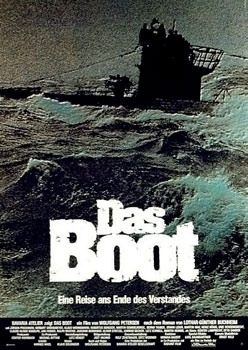Boat
The Directors Cut

English-language version of Das Boot, Germany 1981, directed by Wolfgang Petersen with Jurgen Prochnow as the U-Boat Captain. (DVD)
1941, a U-boat in the north Atlantic. For most of a long and extraordinarily gripping film, we seem to be inside this very long but claustrophobic boat, as it leaves harbour and looks for freighters to sink. By the autumn of that year, the British destroyers have radar and the U-boats have nothing comparable and dread them, as they have no defence. Once located, all they can do is to dive, stop and wait- and hope that the depth charges do not explode too close. How deep can they risk diving? How much pressure can the crew stand- how much can the boat stand, before collapsing?
The characters- that is, the crew of the U-boat- are given space, and we are given space to get to know them, in small, gentle touches. We are living on the boat, with them. When they are attacked, it is we who are diving, waiting, thrown violently by the exploding depth charges, not knowing how badly the boat has been damaged as bolts fly off the walls, the lighting fails and the sea enters. When the attack stops, we have survived- but can the boat be repaired?
U-boats were manned by volunteers from the German Navy, and in the course of the war, of the 40,000 who volunteered, 30,000 did not return. Patriots, certainly, but these volunteers- known as “sea wolves”- were an independently minded lot, having learnt by bitter experience not to believe propaganda, and highly critical of the German high command and the poor information issuing from them. Brave but bloody-minded.
They do hit some freighters, and the U-boat officers, later watching them on fire, are triumphant- but then, appalled when they see men jumping, burning, into the sea. “Why haven’t they saved them?” the captain shouts. “They’ve had six hours!” But he reminds the others of the rule that a U-boar must never take prisoners- and having by then lived with them in those impossibly cramped and complicated quarters, one can understand that it must be so. Triumph- or disaster?
Having survived a major attack, they dock, desperately tired, emotionally shattered, in the rough clothes in which they were tossed about by the explosions, to be greeted by a smart reception committee and praised for their bravery in empty speeches by officers who have suffered nothing and are completely insensitive to what they have been through...... Two worlds which cannot meet.
The new instructions to the boat- to enter the Mediterranean- are practically a death warrant, as Gibraltar is full of British warships and the straights are narrow and patrolled all the time. But the resourceful captain, heartened by the success of his chief officer’s repairs and proud of the sturdiness of his boat, has a plan..... Will they get through? And if they do, what then? What of the war? This amazing fortitude and courage..... for what?
Surely, this must be added to one’s list of great films of war.
